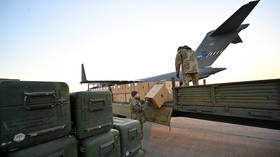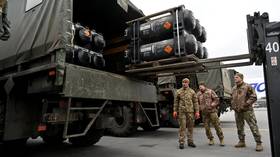No risks in arms supplies to Ukraine – Germany

Germany faces no risks under international law when it supplies arms to Ukraine amid Russia’s ongoing military operation, German Justice Minister Marco Buschmann told Die Welt on Saturday.
Ukraine is fighting a “defensive war,” the minister claimed, adding that it has a right to fight back under the UN Charter. This fact, according to Buschmann, allows other nations to send it weapons without fear of being seen as a party to the conflict.
“When it [Ukraine] exercises its legitimate right for self-defense, supporting with arms deliveries cannot lead [a nation] to becoming a party to war,” Buschmann said, adding that it is not just his personal opinion but “that of the federal government.”
Western governments have been supplying Kiev with arms since the start of the Russian offensive in Ukraine in late February. The deliveries have mostly consisted of small arms, portable anti-tank and anti-aircraft missiles, as well as munitions and fuel. However, some states are sending heavier arms as well. In particular, Slovakia confirmed donating a Soviet-era S-300 air defense system to Kiev.
Ukraine has repeatedly demanded that its Western backers provide heavy equipment such as tanks and aircraft. Prague has reportedly delivered some tanks, although Czech officials have not officially confirmed the move.
The German defense company Rheinmetall also mulled sending old German Leopard 1 tanks to Kiev, but Vice Chancellor and Economy Minister Robert Habeck later said they would not be combat-ready for quite some time and could require months to be made usable.
Russia has repeatedly warned NATO against sending arms to Ukraine and stated that it would consider arms convoys to be legitimate targets. Earlier this week, Deputy Foreign Minister Sergey Ryabkov warned that Russian forces would specifically view “American-NATO transports carrying weapons across Ukrainian territory” as such.
Russia attacked the neighboring state in late February, following Ukraine’s failure to implement the terms of the Minsk agreements, first signed in 2014, and Moscow’s eventual recognition of the Donbass republics of Donetsk and Lugansk. The German and French brokered protocols were designed to give the breakaway regions special status within the Ukrainian state.
The Kremlin has since demanded that Ukraine officially declare itself a neutral country that will never join the US-led NATO military bloc. Kiev insists the Russian offensive was completely unprovoked and has denied claims it was planning to retake the two republics by force.













